Boost Your Vocabulary for IELTS Speaking with Stories
👇 Take this lesson with you! 👇
Struggling to improve your vocabulary for the IELTS Speaking test?
The answer might be simpler than you think: STORIES!
Here’s why stories are your secret weapon for learning vocabularyfor IELTS Speaking and how you can effectively use them in your study routine.
Table of Contents
Learning vocabulary for IELTS through stories
To leverage stories as a vocabulary learning tool, focus on two main strategies:
1. Reading and Listening to Stories:
Seek out stories slightly above your current English level (about 80% comprehension level is a good benchmark). Initially, concentrate on understanding the plot, characters, and events, treating it like a jigsaw puzzle. Don’t stress about unfamiliar vocabulary right away. Instead, try to guess the meanings of new words from the context, avoiding the temptation to look up every unknown word. Only look up words you don’t know if they are essential to the plot, keep appearing in the story or you just like them.
2. Telling Stories:
Next, recount the stories you’ve read or heard in your own words. You can also create your own stories using new vocabulary you’ve learned. This method helps you to understand and remember new words better.

Why stories work for vocabulary learning
So, why are stories so effective for vocabulary learning? Let’s consider an example:
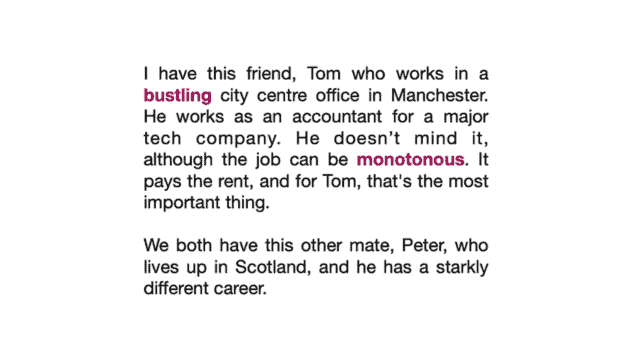
Even in this simple extract, we learn new words like ‘bustling‘ and ‘monotonous,’ while the engaging narrative holds our attention.
- ‘Bustling’ is an adjective which means busy and full of activity. We often talk about a bustling city, office, or work space.
- The word ‘monotonous’ is also an adjective and means unchanging and boring. We often talk about a monotonous job, speech, meeting, or even a monotonous voice.
Stories provide a fun, immersive way of learning, and making vocabulary stick in your memory. They are also relevant and meaningful, which deepens your understanding of new words. Plus, the emotional engagement you experience while reading or listening to a story boosts retention.
Additionally, stories allow you to see words in context. Instead of learning isolated words, you understand how they fit into phrases and sentences. This not only enhances your vocabulary for IELTS speaking but also improves your understanding of English grammar, another essential skill you need for IELTS Speaking.
In the era of the internet, accessing a wide variety of stories is easier than ever, with books, films, videos, and podcasts at your fingertips.
An example of vocabulary learning with a story
Let’s dive into a concrete example. We will continue the story of Tom, adding his friend Peter, a freelance website designer in Scotland, into the mix.
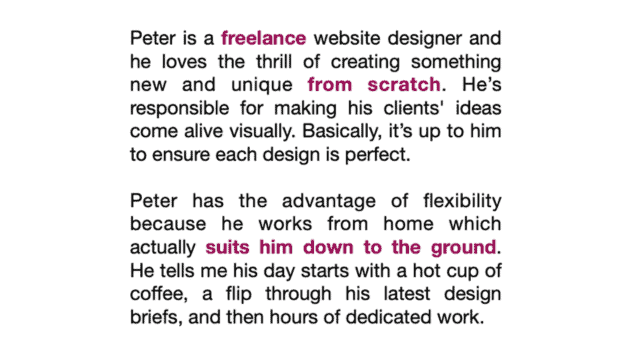
As the story progresses, we come across more new words like: ‘freelance,’ ‘from scratch,’ and ‘suits him down to the ground,’ to name a few. You can probably guess the meaning of these words from the context, and their usage in the story makes them easier to remember.
- To do something ‘from scratch’ means to do it from the beginning. We often say ‘to start from scratch’ or ‘to create something from scratch’.
- The idiomatic expression ‘it suits him down to the ground’ means it is perfect for him. We often say a job or an item of clothing ‘suits you down to the ground’.
Let’s see what happens next in the story.
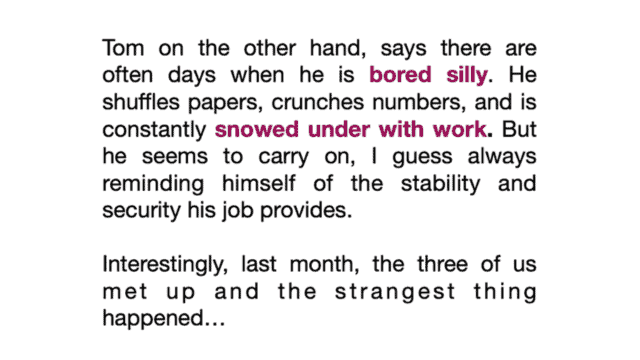
Tom’s job can sometimes be monotonous and he’s often ‘bored silly’ or ‘snowed under’ with work.
- To be ‘bored silly’ means to be very bored, whilst to be ‘snowed under’ means to be very busy or have a lot of work to do. We often say we are ‘snowed under’ with work or emails.
These phrases bring his experience to life in your mind, cementing their meaning in your memory.

Summing up
To supercharge your vocabulary for IELTS speaking:
- Engage with stories by reading, listening, and telling them.
- Understand why this approach works—it engages your brain, makes learning enjoyable, and provides context for vocabulary.
- Experiment with real stories to see the method in action.
Learning vocabulary for IELTS speaking through stories is a powerful, engaging, and fun method. So, dive into a good story today, and watch your English vocabulary flourish!
If you’re interested in a more structured way to implement this method, consider joining my online course, IELTS Speaking Success: Get a Band 7+ GOLD where we use short stories to review vocabulary, ensuring that students remember words and enjoy their learning process.
Improve your Speaking Skills with this Free Course
Crack IELTS Speaking Part 1
Learn to Speak with Confidence in Part 1 of Your IELTS Test!
⭐️⭐️⭐️⭐️⭐️
‘It’s such a great course. I’ve learned so many usages for speaking part 1.’
Zu Htet


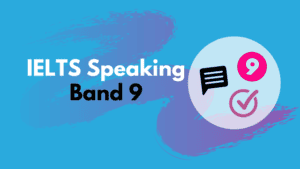
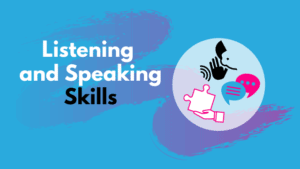

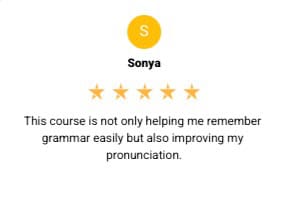
1 thought on “Boost Your Vocabulary for IELTS Speaking with Stories”
hello
I am Mohammad from Iran
Because my country is embargoed, I cannot pay you
Also, due to high inflation in my country, these course fees are very high for us
Thank you for helping me